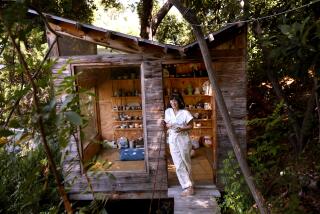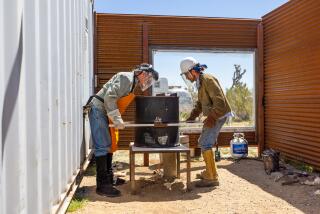Ceramics studio offers hope for formerly incarcerated people — while setting local tables
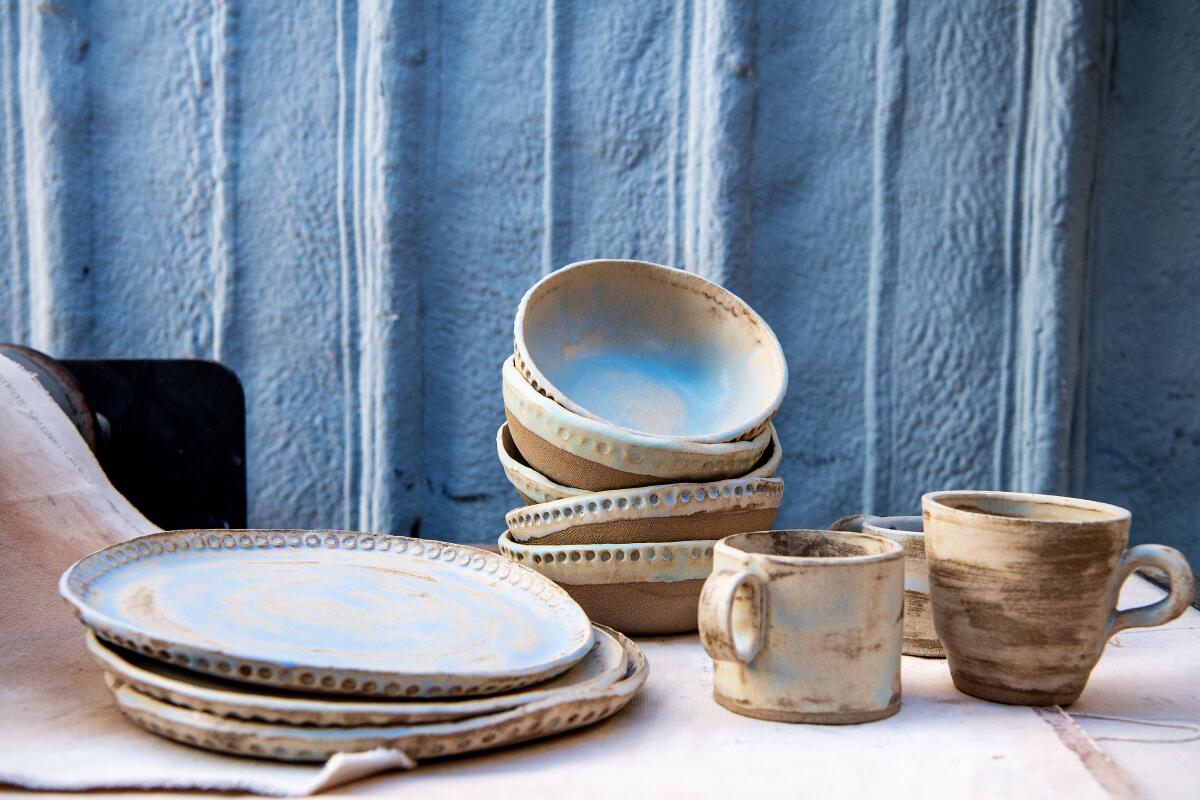
Abolition Blue is the name of the powder-blue glaze used on bowls sold by the People’s Pottery Project, a Glassell Park ceramics studio.
It’s not the official brand name of the glaze but, rather, a title that employees gave it in recognition of the project’s mission. Dominique Perkins, one of the studio’s co-founders, laughs when she says, “We can’t give away the actual glaze name; it’s a secret.”
For PPP co-founder Ilka Perkins, Dominique’s wife, the color signifies something deeper than just a soothing, aesthetically pleasing palette: “I think of the blue as the sky and the brown as the earth or roots. It represents freedom and possibility.”
Abolition Blue pops up on a number of products in the studio’s collection of stoneware bowls, mugs and plates that are nontoxic and oven-, microwave- and dishwasher-safe — pieces that may fill the bill for anyone looking for gifts or yearning to spruce up a dinner table. Prices for individual pieces start at $25, and all the profits from sales and pottery classes are funneled to the nonprofit studio, which was founded by Los Angeles-based artist and activist Molly Larkey in 2019.
But the project is much more than a gift shop. The studio’s ethos is all about prison abolition, empowerment through the arts, and employing formerly incarcerated people, particularly women and members of the queer, trans and nonbinary communities.
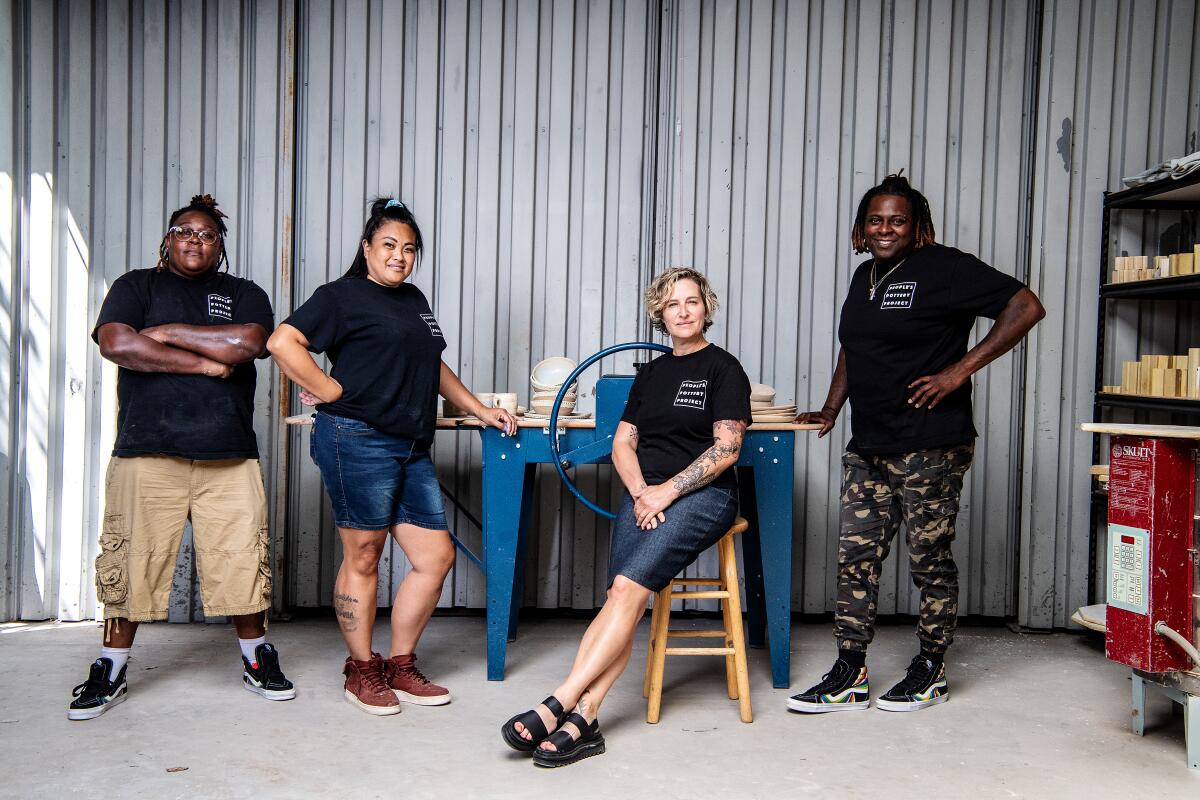
It has been “incredibly meaningful,” says Dominique Perkins, to see people post photos of themselves on Instagram using their handmade wares in their home kitchens. Each purchase comes with a printout of the story of the project and the people behind it. A survivor of “sexual abuse, family dysfunction and drug abuse,” she says she’s excited that people aren’t just purchasing the bowls as a form of charity but because they are beautiful as well.
During lunch break at PPP, everyone uses the extra ceramics lying around. “Eating at the table is such a form of community,” says Ilka Perkins, a fellowship that has helped her reacclimate to life outside of prison.
Larkey and her team dream of collaborating with restaurants to integrate PPP ceramics — serving bowls, plates and mugs, some of them notable for their brown and ivory glazes; others streaked with the aforementioned Abolition Blue — in their service. In the past, many Los Angeles restaurants have invested in custom serving ware and dishes. During the pandemic, which has been especially devastating to the hospitality industry, those kinds of investments plummeted, but they are likely to return as restaurants start to reopen and new businesses emerge.
“Those food businesses interested in getting involved with PPP are encouraged to reach out,” says Larkey, whose work has been on display at the Los Angeles County Museum of Art, MOMA PS1 and numerous galleries. In the meantime, PPP ceramics are sold at LACMA, and the studio has partnered with West Elm’s Local program, selling select bowls on the company’s website.
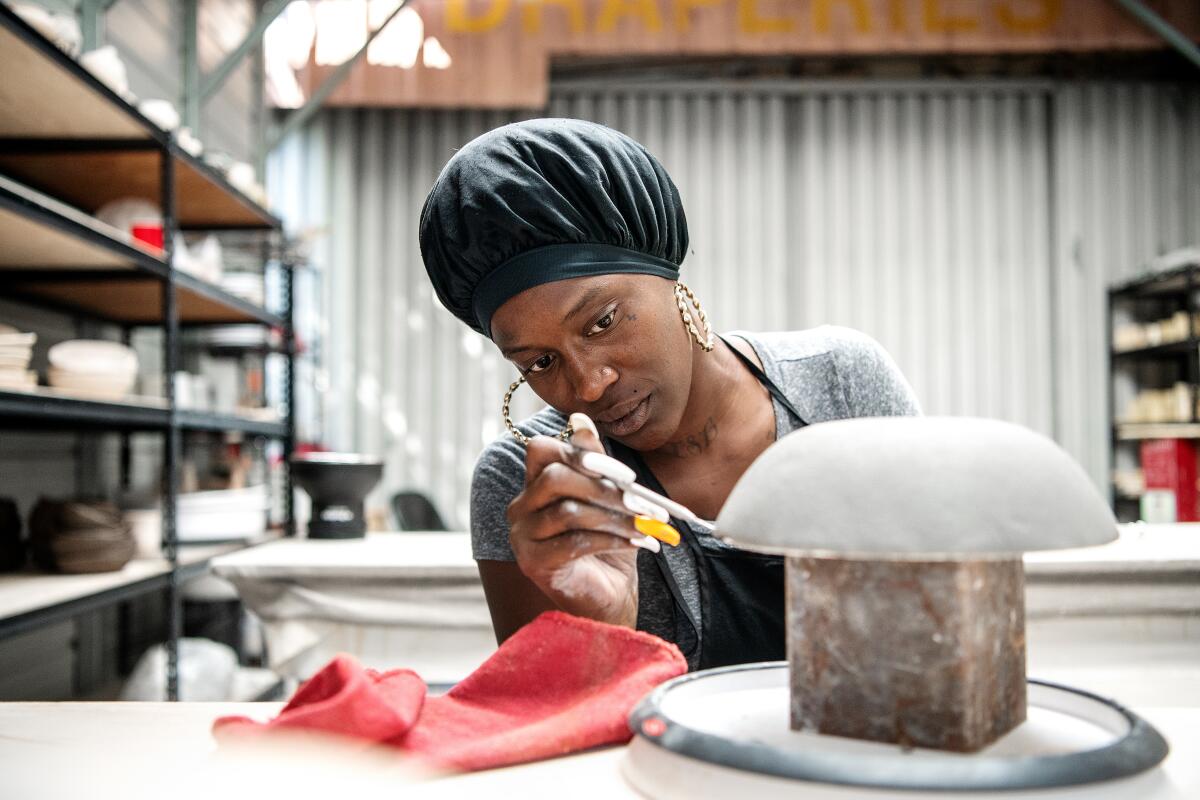
The project was not conceived as a store.
A few years ago, Larkey got involved with Californians United for a Responsible Budget and the California Coalition for Women Prisoners, the organization that connected her to Ilka Perkins. Larkey realized one of the ways she could lend support was by offering Ilka a letter of employment to be her assistant, which she did in 2017. (Proof of employment opportunities, even while inside prison, were necessary for Ilka’s parole.)
In summer 2019, Larkey began hosting free ceramics classes for formerly incarcerated individuals out of her studio, using art as a therapeutic medium. But she soon realized that “even just attending the classes was a barrier to entry for many of the members” — some of whom were experiencing unstable housing situations — and she wanted to make sure they were paid a living wage for their time in class, which led to the People’s Pottery Project.
Now there are five formerly incarcerated employees who have been trained and are continuing to be trained in developing and running a ceramics studio. Sales go toward paying their salaries as well as paid ceramics classes for other formerly incarcerated individuals who drop in.
In addition to the technical skills of ceramics fabrication, employees of PPP learn about inventory management, marketing and strategic business development, while joining a supportive network of other members who have experienced similar hardships.
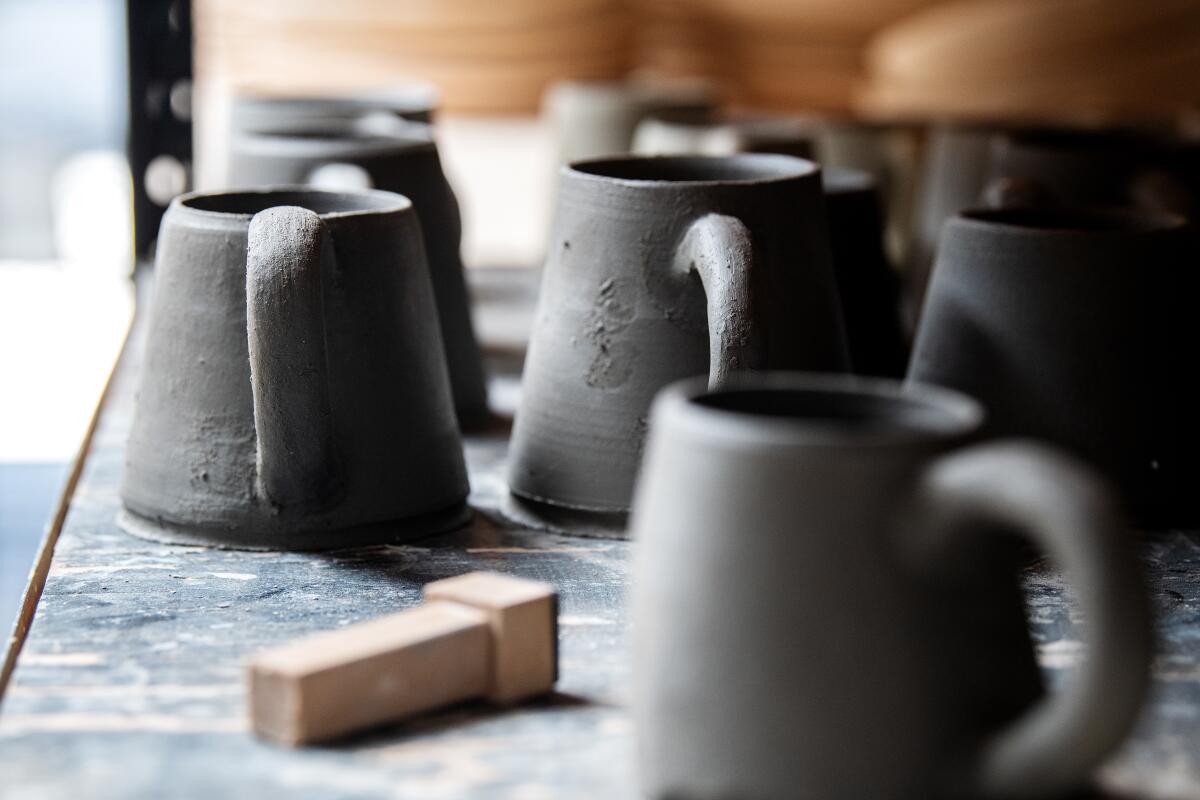
During COVID-19, of course, the concept of community and what it means to host one has had to evolve. And PPP is not the only ceramics studio in Los Angeles navigating that concept.
Echo Park’s Pot, founded by Mandy Kolahi, was launched with the goal of creating a safe space for BIPOC creators — something it has been difficult for her to find in a “very white-facing” part of the arts world.
Comedian Mitra Jouhari, one of Pot’s members, said she had been looking for a hobby that wasn’t tied to her livelihood. She joined the studio mostly out of proximity but, she says, “The reason I kept coming back is because of the incredible environment they created. They are so intentional about the way they treat people and the language they use. It put me at ease and made me feel like art was for me.”
Kolahi has been excited to see Pot become a launching pad for several small businesses. “It’s very special to see people who had never tried pottery before who are now self-sustaining off of it,” she says. Several of the makers focus on items to use at the dinner table.
Inclusivity is of utmost importance at the studio, most easily seen through Pot Community Programming, “a series of practices and perks we offer so these benefits remain accessible to the economically disadvantaged, undocumented immigrants and victims of gentrification who otherwise would not try pottery to due to high costs or lack of diversity,” the Pot website states.
When Pot had to temporarily close down for in-person classes in March 2020, several members rallied around the space to raise money by selling their own ceramics. “We never solicited anyone to donate, it was just a ripple effect where ceramicists from all over the country were fundraising,” Kolahi says. “I didn’t realize the extent of our reach until then; it was motivation to keep pushing.”
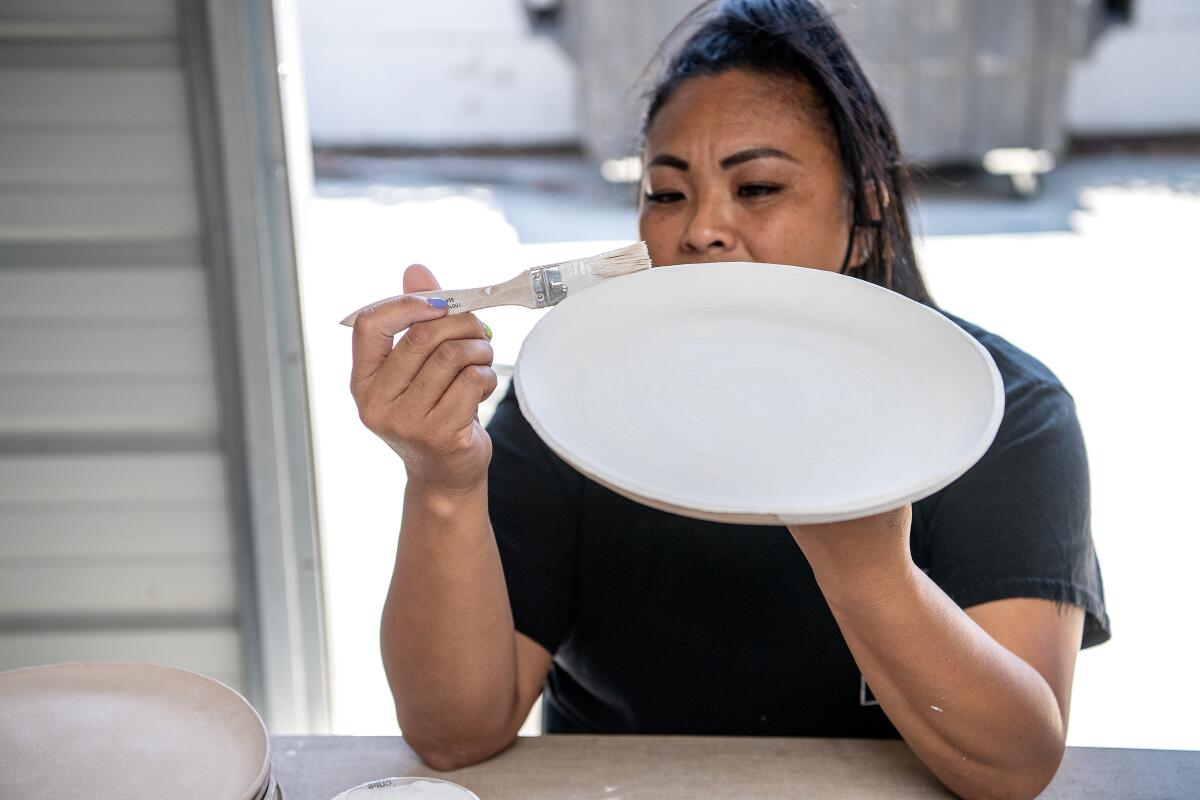
Both Kolahi and Larkey have received feedback about how important it has been to have a tactile stress reliever like ceramics, coupled with the supportive nature of their respective spaces, after the trauma of the pandemic. As their individual programs ramp up in 2021, there is anticipation that involvement will grow.
For PPP, that’s lately meant opening its doors and hosting classes again. To expand its reach, PPP posted an Instagram call for new members who were formerly incarcerated and would be interested in “having fun” and getting paid to take their classes — no experience necessary. For community members who were not formerly incarcerated but are interested in studio time, PPP charges a fee of $50 for three to five hours, which goes to covering the costs of their classes and wages.
“I worked in the prison kitchen for a few cents an hour, and that wasn’t even really a job, because I had to do it,” says Ilka Perkins, who credits the project with providing a sense of stability. “I had so much shame and stigma around being incarcerated. PPP has provided me with dignity and healing.”
More to Read
Eat your way across L.A.
Get our weekly Tasting Notes newsletter for reviews, news and more.
You may occasionally receive promotional content from the Los Angeles Times.

